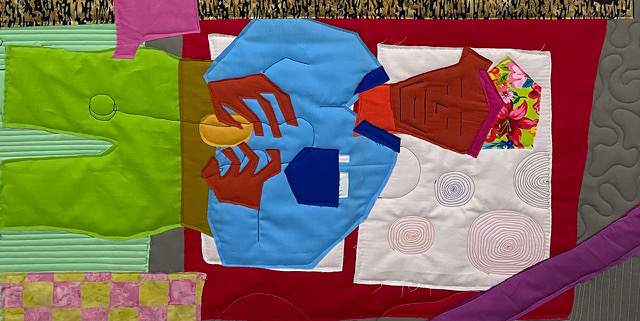
Michael C. Thorpe
Zwangsbeglücker
Exhibition
-> Jul 1 2023 – Aug 5 2023
Fábrica presents Zwangsbeglücker by artist Michael C. Thorpe.
In its first international exhibition, Fábrica welcomes Michael C. Thorpe to Colonia San Pedro de los Pinos, Mexico City. His solo exhibition titled 'Zwangsbeglücker,' is a word created by German artist Martin Kippenberger that means "one who forces others to have fun."
Until 2017, Michael C. Thorpe was an athlete. Born in 1993 in New York and raised in Newton, Massachusetts, he spent most of his youth and adulthood in regimented play. He played basketball at Emerson College (Massachusetts, USA), where he also earned a degree in Photojournalism. There was a change, and Thorpe felt the urge to do something with his hands. One day, Michael decided to experiment with a new knitting machine purchased by his mother and original quilting teacher. The muscle memory of the trade he learned as a child took its toll and he quickly made it his own. Weaving poetry, borrowed language and dreams. Michael also experimented with the layering of colorful materials, scale and analog movements by hand guiding the long arm of the machine to develop his own personal texture so that his hand could be seen in the quilting.
Quilting is a craft rooted in many cultural traditions around the world, but its American expression links unique histories and migrations. Most of the time it was considered a utilitarian craft, since women were relegated to this art in the domestic space. Only in recent history has it been recognized by the Fine Art community and it still has a long way to go in terms of its place in the art world. According to Thorpe, he has had to fight for his work to be considered just art, instead of always being relegated by curators to the "textile" departments of museums.
American quilting is also an important heritage storytelling medium through which many black slaves from the American South documented their daily lives and struggles. Gee Bend's Quilters of Alabama is one of the most iconic examples.
At 29, Thorpe is quite prolific. His way of telling personal and imaginary stories through the language of quilting took off like a rocket.
In a way, the fact that Thorpe produces so much allows her not to be too picky about his work. Rather he can dedicate himself to his process and just express himself, without thinking about what people will think of them or how good they will look. He attributes his "success", so to speak, to the trust he has found in the creative community. Whether curated, gallery, museum, clothing stores, from institutional to independent, Thorpe says "people have just let me rock." It is not lost on him that one of his biggest influences, Lorrain O'Grady — a pioneering figure in performance, conceptual and feminist art — had his first retrospective exhibition at age 86. At 29, Thorpe has three major museum exhibitions this year alone. In this sense, he takes the job seriously, but he doesn't take seriously the art world, the hype and the perception that "you have to do things right."
Today, Thorpe is focused on walking his own path as a "full-length artist," citing kinship with the likes of Martin Kippenberger, Milford Graves, and Something Else Press, a radical art publication that ran from February 1966 to April 1973. These recent references encourage "embracing the absurd." A concept that, according to Thorpe, has evolved his practice and his perspective on how the process really rules. Thorpe has "established systems to be as free as possible" in his creative expression. For example, his practice has generally been to make an initial sketch, then trace the sketches as large as possible to define scale, then cut out the pieces, then assemble them like a huge puzzle. Continue this process until the climactic moment, when all the puzzle pieces are cut up and scattered everywhere. Thorpe determines that he no longer needs to sew the pieces together to match the original sketch. At that crossroads, he can connect them in any way he sees fit. This system of absurdity created a true freedom to which Thorpe responds: "I used to draw, now I make art."
— Fábrica